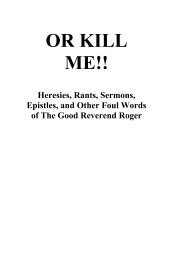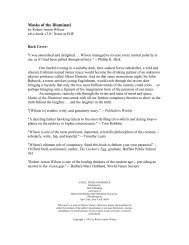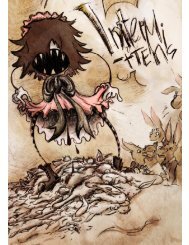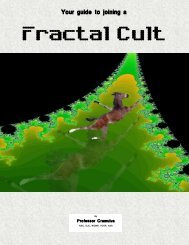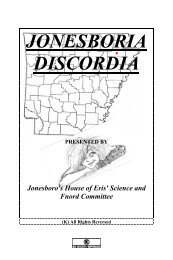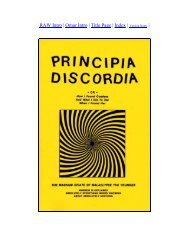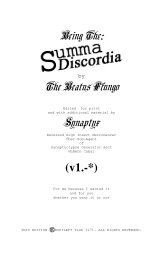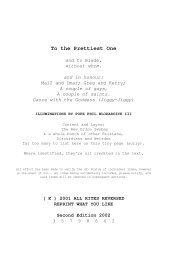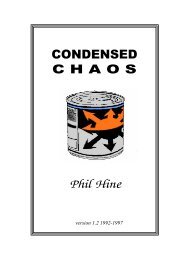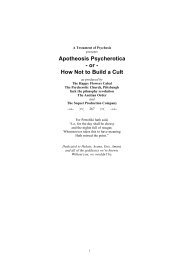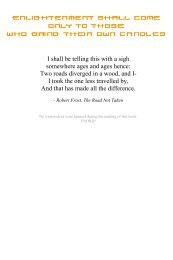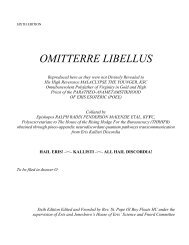Coincidance - Principia Discordia
Coincidance - Principia Discordia
Coincidance - Principia Discordia
Create successful ePaper yourself
Turn your PDF publications into a flip-book with our unique Google optimized e-Paper software.
COINCIDANCE 93<br />
of his own narcissistic agenbite until Bloom delivers him.<br />
This is why Stephen tells the fatuous Englishman, Haines, that the Irish<br />
artist is the servant of two masters—the imperial British State and the<br />
Roman Catholic Church. In this sense also, the dead live: the Irish writer of<br />
Joyce's day made his obedience to the dead invaders and traitors who made<br />
Ireland a colony of Rome and of England, or else he was forced to choose<br />
Joyce's path of exile: as did Shaw and O'Casey and Beckett and a dozen<br />
lesser lights along with Joyce.<br />
For Bloom, as for Stephen, God is either dead or missing-in-action; but<br />
Bloom, at 38, has been a freethinker longer and is no longer hysterical about<br />
it. Approaching middle-age (by 1904 standards, when average life expectancy<br />
was 50), Bloom has lost faith, successively, in Judaism, Protestantism,<br />
Catholicism and Freemasonry; one feels that his attachment to Socialism is<br />
precarious also. In the abyss of uncertainty, Bloom remains a modern<br />
Ulysses steering his way diplomatically and prudently among such hazards<br />
as drunken Catholics (Simon Dedalus), anti-semitic Nationalists (the<br />
Citizen) and unctuous undertakers who may be police informers (Corny<br />
Kelleher). Mourning his dead son, ashamed of and yet attached to his father<br />
who died a suicide, knowing his wife is "unfaithful," Bloom retains<br />
equanimity and practises charity discretely and inconspicuously: feeding the<br />
seagulls, helping the blind boy across the road, negotiating to protect the<br />
rights of Paddy Dignam's widow, visiting Mina Puref oy in hospital. Lest we<br />
think this kindly chap a paragon, Joyce keeps Bloom in the same precise<br />
naturalistic focus as we watch him defecate, urinate, peep into a masochistic<br />
porn novel and masturbate. Joyce announced that he did not believe in<br />
heroes, and Bloom is no hero: just an ordinary decent man. There are a<br />
million like him in any large city: Joyce was merely the first to put him in a<br />
novel, with biological functions and timid courage unglamorized and<br />
uncensored.<br />
The climax of Ulysses—the brothel scene in which Stephen, drunk,<br />
actually sees his mother's ghost cursing him, and Bloom, exhausted, dreams<br />
in hypnogogic revery of his son not at the age of his death (11 days) but at the<br />
age he would be if he had lived (11 years)—brings us back to the living<br />
presence of the absent dead. But in that scene also, Bloom's timid courage<br />
becomes timid courage as he risks scandal, gossip, disgrace and even<br />
associating with the possible informer, Corny Kelleher, in order to protect<br />
Stephen from two drunken and violent English soldiers. This is the pivotpoint<br />
of the novel, and, since Joyce carefully avoids revealing Bloom's actual<br />
motivations, critics have had endless entertainment "interpreting" for us.<br />
My own guess is that, even if Bloom is looking for a substitute son, as<br />
some say, or has unconscious homosexual urges as others claim, or is



